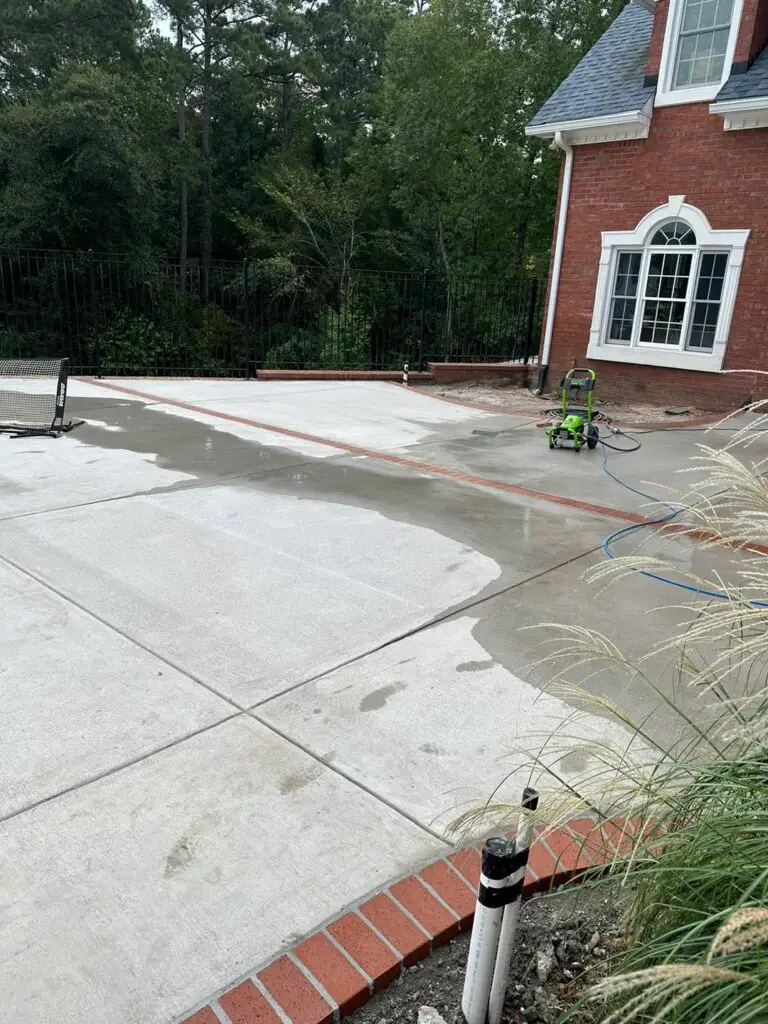Concrete installation can be complex, particularly when understanding the costs involved. From the price of raw materials to labor costs, a myriad of factors can influence the final bill.
This guide aims to illuminate the financial aspects of concrete installation, providing a clear and concise understanding of what to expect. Whether you’re a homeowner embarking on a DIY project or a local concrete company seeking to streamline your pricing strategy, this guide is your go-to resource.
We delve into the intricacies of concrete installation costs, breaking down each element and its potential impact on your overall expenditure. This comprehensive exploration allows you to plan your project confidently, ensuring you’re well-equipped to make informed decisions every step of the way. So, let’s dive in and unravel the mystery of concrete installation costs.
How Much Does Concrete Installation Cost?
The cost of concrete installation can vary significantly based on several factors. One of the primary determinants is the type of concrete being installed. For instance, stamped concrete tends to be more expensive than plain concrete due to the extra labor and materials involved.
Another critical factor is the size of the project. More extensive projects usually cost more, but they may offer economies of scale that reduce the per-square-foot cost. The complexity of the project also plays a role. Projects involving intricate designs or difficult site conditions can increase the concrete installation cost.
The location of the project can also affect the cost. The cost of labor and materials can vary from one region to another. Similarly, access to the site can impact the price. The concrete installation cost can increase if the site is hard to reach or requires special equipment.
Here are some average costs for different types of concrete:
- Plain Concrete: $3 – $7 per square foot
- Stamped Concrete: $8 – $12 per square foot
- Colored Concrete: $6 – $15 per square foot
However, these are just average costs. The actual cost can be higher or lower depending on the abovementioned factors. It’s always a good idea to get several quotes before deciding. Moreover, it’s essential to ensure that the quote includes all the necessary work, such as site preparation and finishing. Hidden costs can significantly increase the overall cost of concrete installation.
What Factors Influence Concrete Costs?
A variety of factors influence the cost of concrete installation. Firstly, the type of concrete used plays a significant role. For instance, although more durable, high-performance concrete is more expensive than regular concrete. The quality of the concrete also impacts the cost. Higher-quality concrete, which is more resistant to environmental damage and lasts longer, can increase the overall price.
The size and complexity of the project also significantly affect the cost. Larger projects require more concrete, increasing the total cost. Similarly, complex projects that require intricate designs or specialized equipment can also drive up costs.
Location is another factor that influences concrete costs. Prices tend to be higher in areas with higher costs of living. Additionally, the project site’s proximity to the concrete supplier can impact the cost and transportation expenses.
The labor costs involved in the installation process also contribute to the overall cost. Skilled labor is essential for a successful concrete installation, and the cost of this labor can vary based on the level of expertise required and the local labor market.
Lastly, the current market price of raw materials used in concrete production, such as cement, sand, and aggregate, can influence the cost. If these materials are in high demand or short supply, the cost of concrete can rise.
Understanding these factors can help individuals and businesses better anticipate concrete costs and plan their budgets accordingly.
When considering a DIY concrete installation, several factors come into play that can affect the project’s cost-effectiveness. The primary costs associated with installing concrete involve material, labor, and equipment costs.
Material costs are usually the most significant expense in a concrete installation project. The price of concrete varies depending on the type and quality of the material. For a DIY project, you will need to purchase the concrete and any necessary additives or reinforcements.
Labor costs are another significant expense. However, in a DIY project, you would do the work yourself, eliminating this cost. This is where the potential for cost savings comes in. However, it’s crucial to consider the time and effort you will need to invest in the project.
Equipment costs can also add up. You will need to rent or buy the necessary tools and machinery for the job, including a concrete mixer, trowels, and other specialized equipment.
In terms of cost-effectiveness, a DIY concrete installation can save you money, primarily by eliminating labor costs. However, it’s also important to consider the potential risks and challenges. If you lack experience, you could make mistakes that could cost more.
Therefore, whether or not a DIY concrete installation is cost-effective depends on your circumstances, including your skill level, the project’s complexity, and the amount of time you can dedicate to it.
Conclusion: Grasping the Financial Implications of Concrete Installation
Understanding concrete installation costs is crucial for informed decision-making in construction projects. The cost of concrete installation varies greatly and is influenced by numerous factors such as the type of project, location, labor, and materials.
While DIY concrete installation might seem cost-effective, lacking professional expertise can lead to costly mistakes. Therefore, it’s essential to weigh the potential savings against the risks. As construction trends evolve, these costs and considerations may also change, necessitating continuous learning and adaptation. Conduct thorough research and consult a professional before embarking on any concrete installation project.
